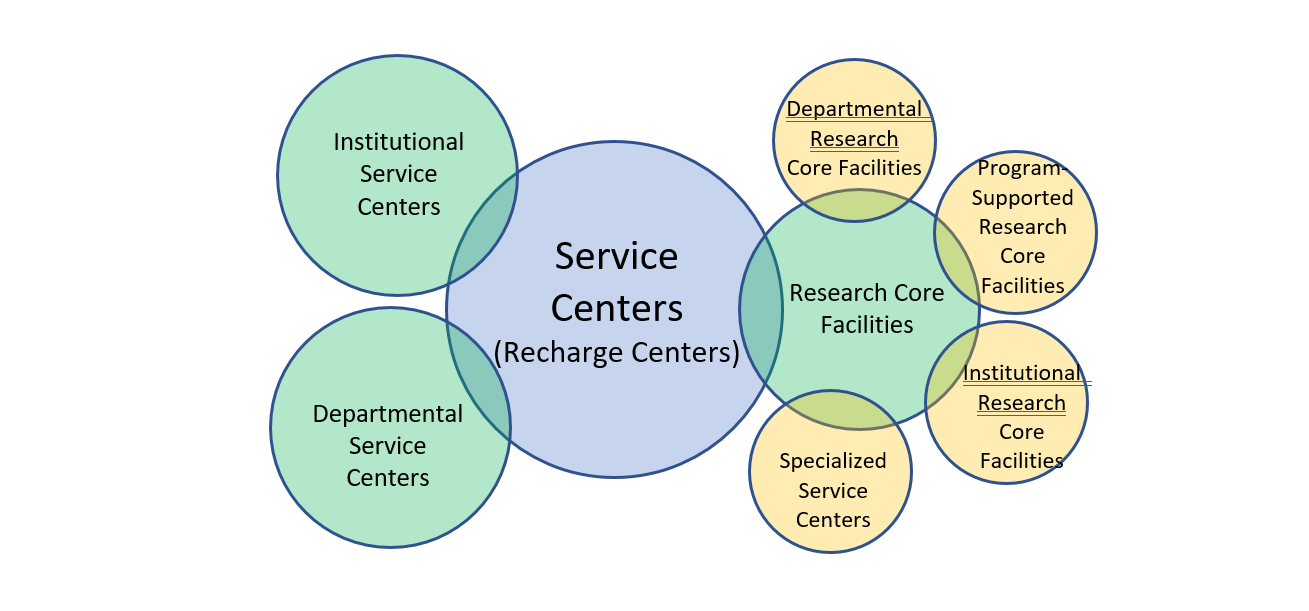Definitions

WHAT IS A SERVICE CENTER?
An operating unit within the University that provides:
- goods or services
- to customers, principally within university
- for a fee.
A service center (also called a recharge center) is an operating unit created for the primary purpose of providing goods, services or group of services to users principally within the University community. The services may range from highly specialized to typical, necessary functions. Often, the services can be provided with greater efficiency or cost effectiveness by internal service centers compared to external vendors. The service center develops a rate(s) based on its costs and charges users based on actual usage.
A service center may be housed in a department, or may operate university-wide. Service centers not classified as research core facilities generally do not have anything to do with research. They may include printing and copying centers or facilities management centers.
Cost Accounting Standards (CAS) Disclosure Statement (DS-2) pdf, Section 3.2.0: “Service centers are departments or functional units which perform specific technical or administrative services primarily for the benefit of other units within a reporting unit. Service centers include 'recharge' centers and the 'specialized service facilities' defined in 2 CFR 200.468."
WHAT IS A RECHARGE CENTER?
Recharge centers at universities, (also known as specialized service centers), operate as in-house enterprises that provide goods or services to individuals or other operating units. These centers function as a non-profit businesses, funding operations through fees from users.
WHAT IS A CORE FACILITY?
Research core facilities operate as service centers, but are specifically research-oriented. They may include microscopy facilities, high-speed computing facilities, magnetic resonance facilities, and other centers with specialized research equipment. These cores may be supported by a single department, a program, or by the institution as a whole.
Core facilities can be defined as centralized shared resources that provide access to instruments, technologies, services, as well as expert consultation and other services to scientific and clinical investigators.
The typical core facility is a discrete unit within an institution and has dedicated personnel, equipment, and space for operations. In general, core facilities recover their cost of providing service in the form of user fees that are charged to an investigator's funds, often NIH or other federal grants.
Research core facilities (also known as cores) operate as recharge centers and are centralized shared research resources that provide access to instruments, technologies, services, as well as expert consultation and other services to scientific and clinical investigators. The typical core facility is a discrete unit within an institution and may have dedicated personnel, equipment, and space for operations. In general, core facilities recover their cost, or a portion of their cost, of providing service in the form of user fees that are charged to an investigator's funds, often to NIH or other federal grants. A core facility can share similar operating principles with other service (or recharge) centers, which also may provide resources necessary to support the research objectives of an institution. Institutions establish core facilities, including the corresponding costing structure of the facility, to provide required services to users generally with all or a portion of the cost of these services charged to users' accounts.
Each core is organized to provide user services that facilitate research activity; the recharge cost center model offers an efficient mechanism for recovering direct costs associated with providing these services. User fees are “charged back” to an investigator’s grant or contract fund. Scientific services offered by cores to the research community typically include specialized products, expertise, state-of-the-art equipment and/or technology. By definition, cores are not dedicated to the work of a single research group or department, but should maintain equitable access to all investigators and be open for new business. Successful operation requires actively involved scientific and managing directors who interact with researchers and staff across a range of disciplines.